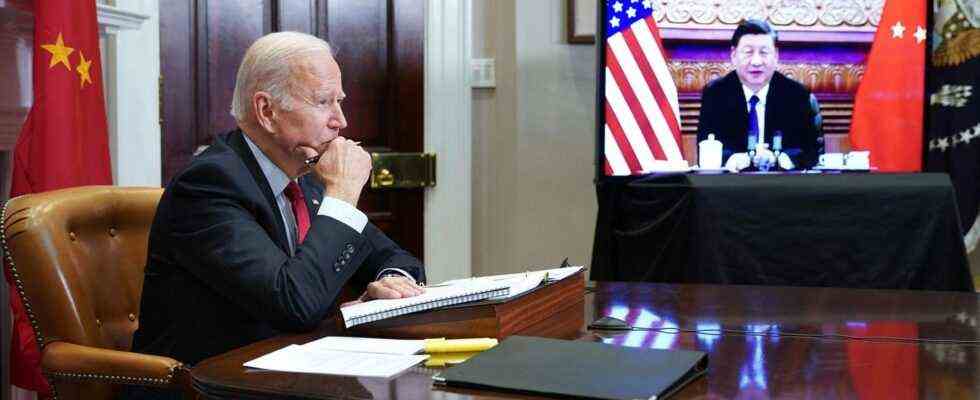Three-hour video slot
Superpower phone call: Biden warns of confrontation and Xi calls the US president “an old friend”
The video switch between US President Joe Biden and China’s President Xi Jinping lasted around three and a half hours
© Almond Ngan / AFP
The relationship between the US and China has never been more tense. Points of contention include the origin of the coronavirus and climate protection. Could the eagerly anticipated Biden virtual summit with President Xi now cause de-escalation?
US President Joe Biden warned of a confrontation between the world’s largest economies at his first online summit with China’s head of state and party leader Xi Jinping. Biden said on Monday evening (US local time) at the beginning of the conversation with Xi that it was their responsibility to “ensure that competition between our countries does not degenerate into conflict, whether intentional or unintentional.” At the same time, Biden emphasized “that all countries must adhere to the same rules of the game”. The US would always stand up for its interests and values as well as those of its allies and partners.
Xi expressed willingness to “build consensus and take active steps with Biden to move China-US relations in a positive direction,” as quoted by the Xinhua news agency. The Chinese government was positive about the first video conversation between party leader Xi Jinping and US President Joe Biden. The meeting was “far-reaching, in-depth, outspoken, constructive, substantial and productive,” commented Foreign Office spokeswoman Hua Chunying on Tuesday in a first short reaction on Twitter. “It helps to expand mutual understanding.”
Good relationships are important in order to promote development in both countries, to ensure a peaceful and stable international environment and to find effective answers to global challenges such as climate change or the corona pandemic. As the largest economies and permanent members of the UN Security Council, the US and China should live up to their international responsibilities, Xi said, according to the official Xinhua news agency.
Xi calls Biden “an old friend” – the reverse is not true
Biden made a similar statement. The US President spoke out in favor of “guard rails of common sense”. Both sides would have to honestly say “where we disagree and work together where our interests overlap, especially on important global issues such as climate change”. For the two powers it is a matter of assuming responsible leadership roles in the world.
Xi called Biden “an old friend” according to state television. The White House spokeswoman Jen Psaki said shortly before the video conference that Biden did not consider Xi an “old friend”. The Democrat still knows Xi from his time as US Vice President under Barack Obama. Last month, Biden told CNN that he had spent more time with Xi in his political career than any other head of state or government.
As president, Biden sees Beijing as the most powerful competitor and the number one geopolitical challenge. The online summit is his first face-to-face, albeit virtual, encounter with Xi since taking office in January. They had spoken on the phone twice before, the last time in September.
Relationship between the USA and China more strained than ever
The video conference, scheduled for several hours, took place against the background of growing tensions between the United States and China. The relationship is more strained than ever since diplomatic relations were established in 1979. A selection of points of contention:
- Taiwan: Biden recently spoke of a US “obligation” to defend the island democratic republic in the event of a Chinese attack. Beijing regards Taiwan as part of the People’s Republic and threatens to be conquered for “reunification”. The US also rejects China’s territorial claims in the South China Sea.
- Human rights: The US is concerned about the suppression of the democracy movement in Hong Kong and criticizes the persecution of the Uyghur ethnic minority in Xinjiang. Biden emphasized in a speech to the US Congress in April with a view to China: “No responsible American president can remain silent when fundamental human rights are violated.”
- Trade conflict: Since the time of Biden’s predecessor Donald Trump, the two leading economic powers have been fighting a trade war with mutual punitive tariffs. Biden’s government accuses China of “unfair economic behavior” through state subsidies, for example.
- Coronavirus: Trump was accused of racism because he called the virus “Kung Flu” in reference to its origins in China – “flu” means flu in English. Biden is more diplomatic, but still caused trouble with Beijing: He commissioned the US secret services to check whether the virus might originate from a Chinese laboratory. The investigation did not give a definitive result.
- Climate: Biden had criticized Xi’s absence from the climate summit in Glasgow a few days ago as a “big mistake”. Surprisingly, the USA and China, the world’s largest producers of fossil CO2 emissions, then announced that they would expand their cooperation in the fight against climate change. “The US and China have no shortage of differences,” said US climate protection commissioner John Kerry. “But with the climate, that’s the only way to cope with this task.”

